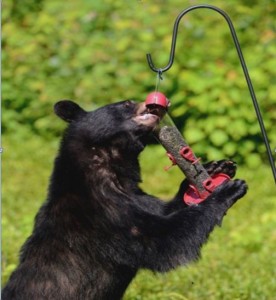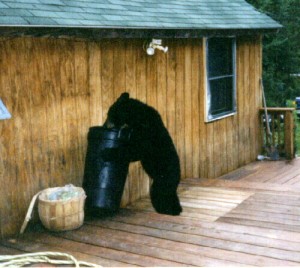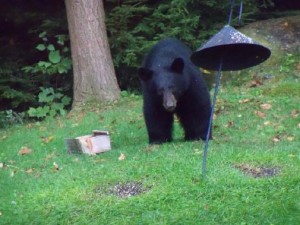May 7, 2015 at 3:28 pm
 Nuisance bear calls are on the increase this spring, and the Department of Inland Fisheries and Wildlife is reminding homeowners to remove potential bear attractants from their yard.
“Maine has a growing bear population, and this time of year, hungry bears are out looking for food,” says Jen Vashon, IFW’s bear biologist. “We want to remind people to remove attractants so they don’t create a potentially dangerous interaction with a hungry bear.”
Already, the department has received over 40 nuisance bear complaints this spring, spread throughout the state. Annually, the Department handles approximately 500 nuisance bear complaints, with May and June being the busiest months for complaints. In 2014, the department responded to over 700 complaints for the year.
Black bears emerge hungry from their dens after losing between 15-40% of their weight during winter and they immediately start looking for food. Bears will often turn to suburban attractants such as bird feeders, pet food, and unsecured garbage bins when natural foods are not available.
Nuisance bear calls are on the increase this spring, and the Department of Inland Fisheries and Wildlife is reminding homeowners to remove potential bear attractants from their yard.
“Maine has a growing bear population, and this time of year, hungry bears are out looking for food,” says Jen Vashon, IFW’s bear biologist. “We want to remind people to remove attractants so they don’t create a potentially dangerous interaction with a hungry bear.”
Already, the department has received over 40 nuisance bear complaints this spring, spread throughout the state. Annually, the Department handles approximately 500 nuisance bear complaints, with May and June being the busiest months for complaints. In 2014, the department responded to over 700 complaints for the year.
Black bears emerge hungry from their dens after losing between 15-40% of their weight during winter and they immediately start looking for food. Bears will often turn to suburban attractants such as bird feeders, pet food, and unsecured garbage bins when natural foods are not available.
 “It is important for people to be proactive so they don’t attract bears to their homes. Don’t wait until a bear gets to your birdfeeder or grill. They become accustomed to the location where they find food and they will return,” said Vashon.
Much of a bear’s diet is vegetation, but with the late winter, many natural foods such as leaves and grasses are not yet available. This time of year, bears will feed on grasses and sedges near wetlands, and well as the roots, tubes and bulbs of plants such as skunk cabbage and others. Bears are also opportunistic carnivores, and will also feed on moose calves, deer fawns, and livestock.
Bears that live near people often rely on foods inadvertently provided by people, such as highly nutritional sunflower seeds being fed to birds. Birdseed and other attractants should be removed to prevent attracting or creating nuisance bears.
In order to keep your home less attractive to bears, please:
“It is important for people to be proactive so they don’t attract bears to their homes. Don’t wait until a bear gets to your birdfeeder or grill. They become accustomed to the location where they find food and they will return,” said Vashon.
Much of a bear’s diet is vegetation, but with the late winter, many natural foods such as leaves and grasses are not yet available. This time of year, bears will feed on grasses and sedges near wetlands, and well as the roots, tubes and bulbs of plants such as skunk cabbage and others. Bears are also opportunistic carnivores, and will also feed on moose calves, deer fawns, and livestock.
Bears that live near people often rely on foods inadvertently provided by people, such as highly nutritional sunflower seeds being fed to birds. Birdseed and other attractants should be removed to prevent attracting or creating nuisance bears.
In order to keep your home less attractive to bears, please:
- Take down bird feeders, rake up and dispose of bird seed on the ground, and store remaining bird seed indoors.
- Keep garbage cans inside until the morning of trash pickup
- Keep your barbecue grill clean by burning off any food residue, disposing of wrappers and cleaning the grilling area after use. If possible, store grills inside when not in use.
- Store pet and livestock food inside, and cleanup any uneaten food.